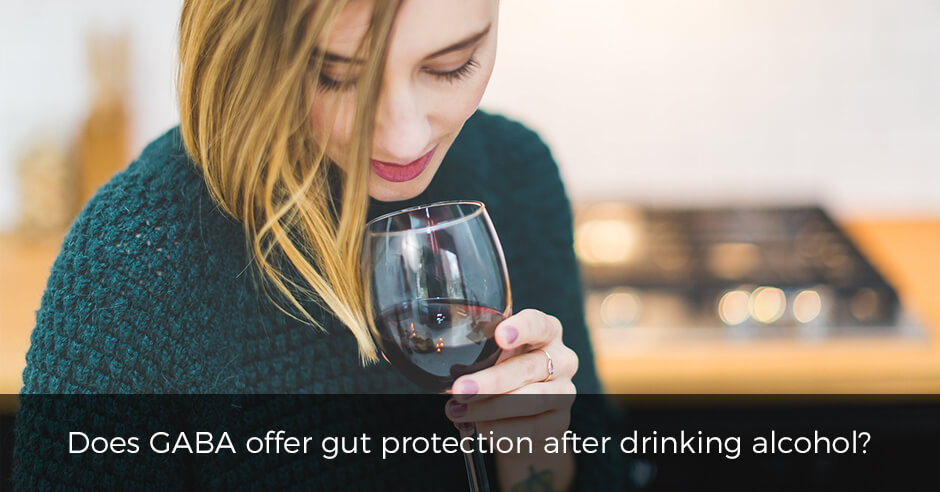
A paper published earlier this year has us asking the question: will oral GABA supplementation offer gut protection in humans who drink too much alcohol? It’s too soon to know but the results from the animal study leave me spell-bound by this calming amino acid yet again!
The paper, Gastroprotective effect of gamma-aminobutyric acid on ethanol-induced gastric mucosal injury
aimed to investigate the gastroprotective effect of gamma-aminobutyric acid (GABA) on ethanol-induced gastric mucosal injury and gastric epithelial cells injury [in rats].
Ethanol or alcohol is known to damage the gut and the study was carried out on rats given GABA and then ethanol.
It was also tested using the human gastric epithelial cell line GES-1 (more here on how human cell lines are commonly used in research) which was incubated with GABA and then treated with ethanol to induce cell injury.
The use of GABA prior to treatment with ethanol
showed that GABA pretreatment significantly reduced gastric ulcer index in a dose-dependent manner.
Administration with GABA could not only remarkably restrain oxidative stress by increase of superoxide dismutase, catalase activities and decrease of malondialdehyde content in gastric tissue and cells, but also significantly reduced pro-inflammatory factors activities (interleukin-6 and tumor necrosis factor α) in gastric tissue.
These studies clearly provided evidence that GABA had a considerable gastroprotective effect on ethanol-induced gastric mucosal injury and gastric epithelial cells injury. The underlying mechanism of mitigating lesions may be ascribed to the improvement of anti-inflammatory and anti-oxidant status as well as the increases of PGE2 [prostaglandin E2] and NO [nitric oxide] levels.
In summary, the use of GABA shows the potential for less ulcers, less oxidative damage, less inflammation in the gut, and gastroprotective properties after alcohol consumption. Human studies will show if oral GABA supplementation offers gut protection in those who drink too much alcohol.
Many social drinkers are not connecting their drinking to stress
We are a stressed society and this leads a great deal of “social” drinking. Many social drinkers are not connecting their drinking to stress and their need to self-medicate and de-stress.
As I found when I posted new study this on facebook – Moderate alcohol consumption as risk factor for adverse brain outcomes and cognitive decline – many social drinkers also get upset when you point out research like this because they don’t want to have to give it up. This CNN article, Moderate drinking may alter brain, summarizes the study and reports that the
moderate group was drinking about 14 to 21 units of alcohol per week, or about a medium glass of wine each night, plus a little extra on the weekends.
What is so interesting is that this very same calming amino acid, GABA, when used to address low GABA levels can help reduce your need to self-medicate or self-soothe with alcohol (or sugar/carbs). Don’t forget, with low GABA levels, you’ll also experience physical anxiety, stiff and tense muscles, overwhelm and panic attacks. I recently blogged about GABA here: GABA for the physical-tension and stiff-and-tense-muscles type of anxiety
Of course, I’d recommend using GABA supplements to address the low GABA and prevent so much “social” drinking that may damage to the gut (i.e. addressing the root cause as always), rather than using GABA so you can prevent gut damage when you do drink.
If you are a big “social” drinker and choose the latter (use GABA to prevent gut damage when you do drink) be warned, you’ll feel calmer and less stressed and very likely reduce your desire and need for a drink!
My blog mentions “social” drinking because of the paper about moderate alcohol consumption above but all this could be equally applicable to heavy drinkers and alcoholics too.
In summary, oral GABA can achieve the following:
- help you quit alcohol and not feel deprived and having to use willpower
- leave you feeling calm and stress-free with no need to self-medicate with alcohol
- heal damage caused to your gut if you do indulge once in awhile (based on projections from the above research)
Have you noticed that GABA reduces your need to drink alcohol?
Have you noticed any improvements in gut health since using GABA?
What Form/Brand do you recommend?
Diane
You can find some brands here https://www.everywomanover29.com/blog/amino-acids-pyroluria-supplements/ I find using GABA sublingually is most effective.
I read online that taking GABA (even small amounts) and drinking alcohol (even small amounts) can be extremely dangerous – and can even cause death.
Judith
Please share a link to where you read this. I suspect it was referring to GABAergic drugs like benzodiazepines (https://www.drugs.com/article/benzodiazepines.html) or gabapentin (https://my.clevelandclinic.org/health/drugs/21561-gabapentin) and not the amino acid GABA.
Yes, it is easier to reduce alcohol with GABA! I was at 750 afternoon and evening, but since I started taking magnesium (depletion because of long term stress) which opens GABA receptors a I read, I had too much GABA, causing flush and making my rosacae worse. I now only take 750 in the afternoon. I think I have found my root cause in the magnesium depletion, but also take other supplements, B vitamins, especially high B1/thiamine because of alcohol and vit C and D and Tryptophan 500 before bed. It is however not easy to find B supplements without niacin, which also sets my rosacae off.
Nicolien
Great to hear it’s easier for you to reduce alcohol with GABA. Interesting to hear magnesium reduces your need for GABA